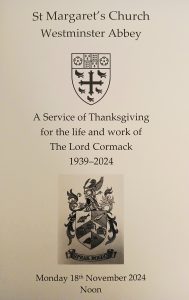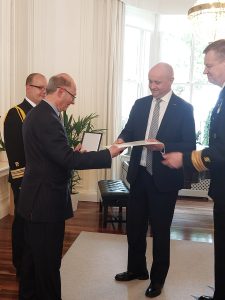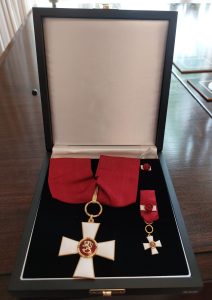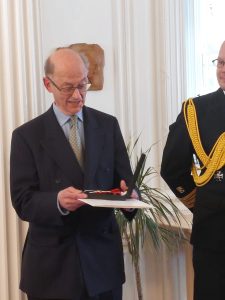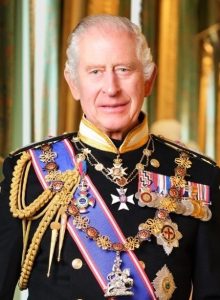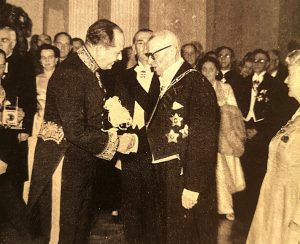November 2024
In Memoriam: Lord Cormack, DL, FSA, FRHistS 1939 – 2024
A Service of Thanksgiving was held for The Lord Cormack on 18 November 2024 at St Margaret’s Church, Westminster Abbey. Council members represented the Society at the Memorial Service.
A Commander of the Order of the Lion of Finland, while he was a Member of Parliament the then Sir Patrick was the Chairman of the British-Finnish All-Party Parliamentary Group. Thanks to him the Anglo-Finnish Society was able to hold an AGM in 2010 in one of the Committee Rooms at the House of Commons. This was followed by a Reception and, as the House was not sitting, a tour of the House. Lord Cormack was a member of the Anglo-Finnish Society for many years.
Lord Cormack had a long career in both Houses of Parliament and was known as an independent thinker unafraid to vote against his own Party on many occasions. Even when disagreeing with people, he was always perfectly polite and kind to everyone. In addition to his long career as a politician, he was also a historian, journalist and author with an interest in historical issues, particularly English Heritage.
=====================================
4 June 2024
Paulus Thomson was awarded the honour of Commander of the Order of the Lion of Finland at a ceremony at the Residence on the Flag Day of the Finnish Defence Forces, 4 June 2024. He has served on the Anglo-Finnish Society Council for many years, and as Honorary Secretary from the late 1990s until 2023. This rarely conferred honour is a fitting recognition for his decades of work in Anglo-Finnish relations. (Antti de Ruano, Hon. Secretary)
=====================================
May 2024
This month the Anglo-Finnish Society has been honoured and delighted to receive confirmation of our two Patrons, HM King Charles III and HE The President of Finland, Mr Alexander Stubb.
HM The King had already been our Patron while Prince of Wales, succeeding his late father HRH Prince Philip, Duke of Edinburgh, who had been our Patron from 1955. Now it has been confirmed that the King remains our Patron.
The Presidents of Finland have been our Patrons from 1955 when President Juho Kusti Paasikivi became Patron soon after the late Duke of Edinburgh had agreed to become Patron.
=====================================
6 May 2023
The Anglo-Finnish Society congratulates
Their Majesties King Charles III and Queen Camilla
on their Coronation.
=====================================
HRH The Duke of Edinburgh 1921-2021
Patron of the Anglo-Finnish Society 1955-2021
I am sure members of the Anglo-Finnish Society are saddened by the death of His Royal Highness The Duke of Edinburgh and will wish to join the Council in sending our most sincere condolences to Her Majesty The Queen and members of the Royal Family.
Prince Philip made three official visits to Finland and at least two other visits. The last official visit was with the Queen on 21 October 1994 on their way back to London following a State Visit to Russia. They arrived in the afternoon aboard the Royal Yacht. The Queen then went to see President Ahtisaari while Prince Philip opened the new transmitter network for Classic FM in Southern Finland at the Sibelius Academy. They flew back to London the same evening.
In 1952 Prince Philip undertook official visits to Norway and Sweden and to the Olympic Games in Helsinki. Newsreel footage shows him arriving in Helsinki on the Trinity House Vessel Patricia, standing in for the Royal Yacht Victoria & Albert which was then deemed unseaworthy. The Duke of Kent (then aged 16) was waiting to greet him at the quayside along with Lord Burghley, who was President of the IAAF and Vice-President of the IOC.
It was Lord Burghley’s involvement with the Helsinki Olympics that led to him being invited to be President of the Anglo-Finnish Society when it was revived in 1953. In March 1955 Lord Burghley was able to confirm to the Council of the AFS that Prince Philip had agreed to be the Society’s Patron. The following November President Paasikivi agreed to act as Patron on the Finnish side.
There was a State Visit to Finland in May 1976 hosted by President Kekkonen. In addition to Helsinki, the itinerary took in Turku and Jyväskylä where, in a forest nearby, the royal party were treated to a demonstration of chain sawing followed by lunch (salmon soup, pancakes, Koskenkorva and Chablis). The guests were seated on a bench constructed of whole tree trunks at a roughly hewn log table. The Queen declined to exchange her hat for a gold hard hat. Protocol did not so constrain President Kekkonen. Many photographs of the State Visit and the documentary film Hello, Elisabeth! (sic) can be seen HERE
It was the State Visit in 1976 and a private visit in 1970 to a trade fair in Helsinki promoting British goods which provided Prince Philip with most of the memories of Finland which he shared with members and their guests at the Dinner at the Grocers’ Hall in May 2012 arranged to celebrate the Society’s Centenary. He recalled being cajoled into drinking too much vodka when enjoying a sauna with President Kekkonen and learning that the way to counteract the effects of this was to share a bottle of Riga Black Balsam. He remembered having learned some Finnish words and numbers, including, no doubt for intended comic effect, mispronouncing seitsemän as “sexy man”. It was a speech which he had clearly taken the trouble to write himself and one which delighted the audience. We were extremely honoured that both Prince Philip and Tarja Halonen accepted the invitation to attend the dinner and celebrate our Centenary with us.
A private visit which Prince Philip made to Finland in May 1995 was recalled in Helsingin Sanomat on 10th April 2021. He went in his capacity as President of the WWF to look at conservation areas in and near Helsinki. The article suggests that his dismay at certain redevelopment proposals by Helsinki City Council may have led to their abandonment or at least curtailment. HERE is a link to the article.
We will all have learned much from the extensive coverage of the life of Prince Philip since his death. He was a remarkable man and it was a privilege for the Society to have had him as our Patron for 66 years.
Paulus Thomson
Finnish Award for Marjatta Bell puts AFS on front page of Helsingin Sanomat
Marjatta’s tireless work as Chair of the Society was marked on Independence Day 2015 by the award of Knight (First Class) of the Order of the Lion of Finland. The formal investiture was carried by the Ambassador, H E Ms Päivi Luostarinen, at her Residence on 16th February. The award was made in recognition of over 30 years of work in Britain for Finland and the Finn-British community and their organisations. The authorities had in mind her contribution to the great series of events which we had in our centenary year, in particular her negotiations to get approval for a commemorative plaque for Edward Westermarck and the international conference honouring his work which she organised more or less single-handed, and more recently the leadership which she has shown in planning public events for next year to mark the centenary of Finland’s independence. Those who can read Finnish will be interested to see the profile of Marjatta which was published in Helsingin Sanomat on 22 February – read more in Finnish at: Nainen, joka on tehokas kuin tornado – Marjatta Bell on edistänyt Suomen ja Britannian suhteita 1970-luvulta lähtien – Ihmisiä | HS.fi
William Richard Mead 1915-2014
Bill Mead was a figure of immense standing in Anglo-Finnish circles and he was responsible for resuscitating the Anglo-Finnish Society after it ceased operations for the duration of the Second World War. After the War there was no focal point for the Anglo-Finnish community. When it was first proposed to revive the Anglo-Finnish Society, Eero Wuori, then head of the Finnish legation in London, advised that it would not be diplomatic to do so until after Finland had completed payment of reparations imposed at the end of the War. That was achieved in August 1952. So, the following year, after Bill had returned from a period of research in Minnesota, a meeting was convened at the Grocer’s Hall to which all those who had been members of the Society before the War were invited together with prospective new members. The reconstitution of the Society along the lines of the Anglo-Norse Society was accepted by acclamation. Lord Burleigh, who had been involved with the Olympics in Helsinki in 1952, agreed to act as the first post-war President, Lionel Neame accepted the Chairmanship and Charles Hambro was Honorary Treasurer. Bill was the Honorary Secretary. He became Chairman in about 1966 and after retiring from that office in 1995 he was given the special title of Chairman Emeritus.
William Richard Mead was born on 29 July 1915 in Buckinghamshire into a family with strong agricultural connections. His earliest memories were of walking over the hills with his father and learning the names of plants, trees, and birds. He was educated at Aylesbury Grammar School, with which he maintained lifelong connections. He wrote a pamphlet on his recollections of Aylesbury in the 1920’s and a history of Aylesbury Grammar School from 1598-1998. After leaving school he obtained a teaching qualification and simultaneously studied for an external BSc (Econ) at London University which he obtained in 1937. A timely legacy from an uncle gave him the opportunity to proceed to take a master’s degree at the LSE. His interest in the music and literature of northern Europe prompted him to look for a Nordic research topic and, as Finland was relatively neglected, he chose Finland and geography rather than economic history.
Bill’s first trip to Finland was with his brother in July 1938. The return journey by ship from Hull cost £10 “including victualling”. From Helsinki they visited Viipuri, Imatra and Lappeenranta by train, thence to Savonlinna and Kuopio by lake steamer and then by train to Jyväskylä and Turku for the return voyage.
Following the successful completion of his MA in 1939, Bill registered to do a PhD at the LSE which had been evacuated to Cambridge for the duration of the war. He became involved with a committee to organise assistance for the Finnish Red Cross at the time of the Winter War. Although Bill had volunteered to join the RAF, he was not called up until June 1940. After initial training he was sent, via an unexpected three months in Iceland, to Ontario. During the war years he was able to make contacts at Canadian and US universities and found time to write a few articles for publication as well as continuing work on his PhD on The Geographical Background to Community of Interest and the North European Peoples.
Bill’s first academic post was as an assistant lecturer in the geography department at Liverpool University from the autumn of 1946. He found Liverpool congenial and the department encouraged his research in Finnish studies. In the spring of 1947 he was invited by the British Council to give a series of lectures on the subject of British economic geography at the School of Economics in Stockholm. Lifelong contacts and friendships were forged with senior geographers from Stockholm and also Uppsala and on the same occasion he also met Helmer Smeds, who had newly been appointed as a professor of geography at Helsinki. Smeds facilitated a trip to Finland in the summer of 1947 where together they examined farming conditions in the Vaasa area and, then, by contrast, visited a Finnish-speaking farming area in Savo, where new lifelong friendships were forged with the family of August Jäntti.
While at Liverpool Bill developed several areas of interest which he added to over successive decades and which he used to give highly entertaining talks which broadened the general interest in Finland among those who heard them. First there was British travellers to Finland, then Finns in English and American fiction (usually cast as necromancers and other shady characters) and Finnish travellers to Britain, particularly Pehr Kalm. It was also at Liverpool that seeds were sown for future research projects, the ridge-and-furrows project in Buckinghamshire, Anglo-Finnish commercial links and the naval wars in the Baltic.
Bill was head-hunted by an agent of the Rockefeller Foundation to spend the academic year 1949/50 as one of four full-time research assistants working under Heikki Waris, Professor of Sociology at Helsinki University, on issues connected with the resettlement of Karelians in Finland. It was agreed that Bill should concentrate his research on the “cold farms” occupied by displaced Karelians in the parish of Lapinlahti. Cold farms had no arable land when they were established and the farmers themselves had to clear the fields and construct the buildings. The object of the research was to study the speed of resettlement and to this end Bill devised questionnaires and persuaded about 30 farmers and their wives to keep work diaries for nine months. It was a matter of regret that the Lapinlahti research was never fully written up in English, but a few papers were published and, as usual lasting friendships and invaluable contacts were made with librarians and archivists as well as the Finnish-British Society in Helsinki and the British Council.
After the Rockefeller year, Bill returned to London and took up a post in the geography department at UCL where contacts were being made with American universities. This led to an invitation to spend a few months at Minnesota from which research could be conducted into the local Finnish communities. When back in London there was an opportunity for a research assistant to come from Finland. The post was taken by Stig Jaatinen and that led to a collaboration with Bill to trace the evolution of Finland in British cartography, published in Fennia in 1956; it was also the start of field trips and research in the Åland Islands which were pursued over many years and led eventually to the publication in 1975 of The Åland Islands which they jointly wrote.
The 1950’s and 1960’s were busy and productive times for Bill. Publications included An Economic Geography of the Scandinavian States and Finland (1957), two books for children How People Live in Norway (1959) and How People Live in Finland (1965), The United States and Canada (1962 written jointly with E H Brown), Winter in Finland: a Study in Human Geography (1967), and Finland (1968). There were also contributions to the works of other authors and numerous articles for British and overseas journals and many lectures given to local geographical or Scandinavian societies, not least of course to the Anglo-Finnish Society where he was always ready to fill a gap in our programme.
In 1963 Bill was appointed Professor of Geography at UCL; he was head of the department from 1966 until his retirement in 1981. In addition to his departmental responsibilities he was Honorary Secretary of the Royal Geographical Society from 1967-77 then vice-president from 1977-81. He also served terms as President of the Institute of British Geographers (1971-2) and the Geographical Association (1981-2). Bill received the RGS Gill Memorial Award in 1951 and the Founder’s Medal in 1980. He was Chairman of the Council of the School of Slavonic and East European Studies from 1978-80. He also served a period as Dean of the Faculty of Arts at UCL.
At the point of his formal retirement Bill published An Historical Geography of Scandinavia, which had been twice as long in preparation as anticipated, mainly because of the ever-expanding volume of material that he felt should be referred to. He remained active in retirement, the first major project being to contribute two chapters to The History of Cartography. It consumed two years of his time and much personal expense. It is an immense project which remains unfinished although volume 3, which includes Bill’s chapter on Scandinavian Renaissance Cartography, was finally published in 2007, a delay of more than 20 years.
Outside academic commitments Bill took part in a series of Anglo-Finnish cultural mixed commissions co-ordinated by the British Council and later the Anglo-Finnish Round Table, a high level symposium drawn from representatives of business, politics and academics in both countries. Informal conversation with Max Jacobson at one of these events led to Jacobson’s suggestion that Bill should write something to account for his connection with Finland. This resulted in An Experience of Finland (1993). He was also involved in the state visits of Finnish presidents to the UK and the practical organisation of the annual dinner dance to celebrate Finland’s Independence Day.
He was awarded Honorary Doctorates by the Universities of Uppsala, Helsinki, Lund and Turku, an honorary fellowship at the LSE, Fellowship of the British Academy, a member of the Finnish Academy of Science and Letters, Chevalier of the Royal Swedish Order of Vasa, Commander of the Order of the White Rose of Finland, Commander of the Order of the Lion of Finland, and Commander of the Order of the Polar Star. He was awarded the Wahlberg Gold Medal by the Swedish Society for Anthropology and Geography and the Fennia Medal by the Finnish Geographical Society, both in 1988, and the Research Medal of the Royal Scottish Geographical Society.
The diaries of Pehr Kalm, particularly those relating to Kalm’s visit to the Chilterns, enabled Bill to make a direct connection between Finland and historical farming conditions. He translated the diaries into English, mostly on public transport when he was travelling from London to Stoke Mandeville to visit his father, who had suffered a severe stroke. In 2003 Bill published Pehr Kalm, a Finnish Visitor to the Chilterns in 1748 to coincide with the centenary of the founding of the geography department at UCL. He published his translation of Kalm’s London Diary in 2013.
Bill’s physical vigour took a knock when he broke his ankle in a riding accident at about the age of 90, when his horse tripped and fell. For his 90th birthday celebrations he was encouraged to write an account of the origin and development of his personal interest in Finland. The Adoption of Finland was published in 2005 by UCL and is the main source for this obituary. To mark the centenary of the founding of the Anglo-Finnish Society Bill wrote a history of the Society, which was launched at a reception hosted by the Ambassador of Finland in September 2011. This was the last time we saw Bill at one of the Society’s meetings. He subsequently suffered a stroke but fortunately he was able to be looked after at home and to continue to work on his interests. He had spent many happy hours studying the archives of the Finnish Economic Society held at Åbo Akademi and in 2013 he was able to publish an Introduction to its work. In the last few days of his life he put the final touches to his Commonplace Book, which it is hoped will be published later this year.
Bill always felt that no day was complete without some writing and some music. Until the last few years he would generally attend concerts or other musical events on an almost weekly basis and when that was not possible there was Radio 3. He was a walking encyclopaedia of information about Finland but he carried his erudition with extraordinary modesty. He delighted in finding unexpected Finnish connections and his talks could spiral away from the main subject as one anecdote would lead to another which he would eventually bring to a halt with the words “but that’s another story”. He was generous with his time and resources but reluctant to be a recipient. The customary presentation to a retiring head of department at UCL was diverted into the Mead Scholarship in Geography for students or junior members of staff to pursue research in northern Europe. On another occasion money collected was given to his local church to go towards the cost of replacing the bells. He was immensely sociable, totally discreet and possessed of a keen sense of humour. He was in so many ways a remarkable man and one for whom it is fair to say “we shall not see his like again”.
Paulus Thomson, August 2014

